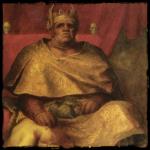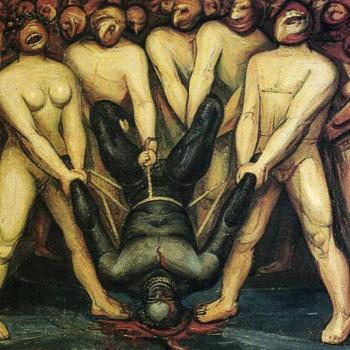
Early in 2017, the redowdable Maureen Dowd interviewed Peter Thiel (for the “Fashion and Style” section of the New York Times). Technology blog Gizmodo printed an orgy of quotes from the interview and gushed about its subject. Both Maureen Dowd and Peter Thiel are currently back in the spotlight for stirring up shit – Dowd for sponsoring the recent lunch where Nancy Pelosi ate her own maladaptive children (the wayward women of “the Squad”) and Thiel for his keynote at the National Conservatism conference in DC where he spoke darkly of Google’s treasonous disregard for US national security. It seems a good moment to revisit their own previous dishy, fawning encounter with each other.
According to the Gizmodo author, Peter Thiel (who used his unlimited bankroll to take down Gizmodo’s parent company, Gawker) “seems totally regular and cool.” Near as I can tell, Peter Thiel is normal, regular, and cool for Gizmodo Guy because his conversational style is to issue clever, provocative, koan-like speech nuggets, somewhat resembling golden poops. Which have the effect of eliciting a surprised, cathartic response from Gizmodo Guy and others, perhaps not unlike Charlie’s response to Willy Wonka. Essentially, “Hey, those are awesome golden poops! They don’t look like normal poops. They’re much harder and shinier. But they look neat!”
My own thoughts are inline below, but I guess my punchline is that in this interview Peter Thiel simply does what really smart people (especially those with a particularly logical bent) often do, which is, with his Pyrrhonian skepticism, to routinize the habit of being contrarian. Software engineers and litigating attorneys may be especially prone to this behavioral tic.
The powerful instinct of these contrarians is not really to listen and ponder and reply thoughtfully to whatever question or topic they are addressing. Instead, they pretty quickly respond with linguistic gymnastics that have little to do with the topic, but instead have the effect of either inspiring intellectual awe of oneself or diminishing the person being addressed. It is a diabolical way to deflect attention from significant matters, both regressively defensive and aggressively depersonal.
As an aside, Maureen Dowd, a provacateur herself, is especially adept at framing her columns or stories to elicit this kind of whack cleverness from the people she interviews (as she somewhat unaccountably did with Nancy Pelosi, who should know better). I’m sure Maureen did her own share of ingratiating showboating during the interview. Haha, Peter Thiel, you 21st-century Marquis de Sade. Aren’t we both delightfully establishment-shocking enfants terrible?
Contrarians are vitally important to healthy debate about goals, ideas, and process. But contrarianism ideally enfolds itself within a mind (individual or hive or otherwise) that also encompasses and embraces a positive mission. Contrarianism is most useful as a subordinate component of mindfulness. When it becomes an end in itself, a type of mental self-recursion sets in (we might call it the Asshole Loop) whereby the instinct to challenge orthodoxy becomes a mindless, repetitive hammer blow.
Anyway, here’s some of what Peter Thiel had to say, with a bit of commentary. I’m mostly (but not exclusively) riffing off the same quotes Gizmodo Guy found so cool and uplifting. With some thoughts at the end about the relevance for this story, in our time, of The Wizard of Oz.
The World According to Peter Thiel
1. Peter Thiel on the incorruptibility of President Obama: “[T]here’s a point where no corruption can be a bad thing. It can mean that things are too boring.”
President Obama is boring explains a lot. Peter Thiel himself is a big believer in “disrupting” things, a term which takes one predictable (and mostly meaningless) form in Silicon Valley’s idealized vision of itself, but quite another form in politics, where paleoconservatives such as Trump are eager to get jiggity with the Devil in order to make things happen. You know we’re fucked when not blowing everything up becomes a sin.
I get the frustration with gridlock, of course. And the frustration with inequality and the sense that America has somehow lost its mojo. However, there is a deeper and more insidious layer of meaning to the idea that Obama = boring.
As the nation’s first African-American president, Obama instantly had to live up to a far higher standard of personal ethics and decorum, along with a far higher standard of moderation and even-handedness on social and racial and foreign policy matters, than any white president. If Obama betrayed any propensity for good old boy / shoot-em-up behavior of the George W. Bush-Bill Clinton variety, he would have been tarred and feathered and run out of town on a rail by the Tea Party crowd.
But in the spirit of getting jiggity with the Devil, Obama was pretty much damned if he did and damned if he didn’t. Because among the legions of those of the Breitbart persuasion for whom Obama’s public existence was always inherently offensive, his incorruptibility, along with his cool rationality, were pretty instantly also interpreted as deficits, of a piece with the storyline that Obama was weak and effeminate.
Consider the almost superhuman grace, discipline, and decency with which he managed this implacable conundrum. Perhaps sustained by a remarkable capacity for reflection on the larger meaning of events, and a terrific sense of humor (something both Donald Trump and Peter Thiel absolutely lack).
2. Peter Thiel on Donald Trump and sexual assault: “On the one hand, the tape was clearly offensive and inappropriate. At the same time, I worry there’s a part of Silicon Valley that is hyper-politically correct about sex.”
Peter Thiel is gay and presumably therefore views himself as hiply transgressive. But most American institutions have become “hyper-politically correct about sex,” not just Silicon Valley corporations. Some of this driven by demographics (more women in the workforce, but perhaps not enough women in the workforce in places that matter, and an awareness that even limited workforce equity requires robust standards for managing how people interact professionally). But also, for legal and accounting fiduciaries at these places, a matter of managing legal and regulatory risk. At any rate, in this response, Thiel simply punts on the larger issue of accountability for one’s actions. His thoughts about the Trump tape are consistent with the whole-cloth abdication on this issue of accountability by Trump and his minions, itself a Sade-like liberation of dark energy for supporters in the “heartland” who similarly hunt for vengeance and catharsis.
3. Peter Thiel on Star Wars versus Star Trek: “I like ‘Star Wars’ way better. I’m a capitalist. ‘Star Wars’ is the capitalist show. ‘Star Trek’ is the communist one. There is no money in ‘Star Trek’ because you just have the transporter machine that can make anything you need. The whole plot of ‘Star Wars’ starts with Han Solo having this debt that he owes and so the plot in ‘Star Wars’ is driven by money.”
Just a glib and stupid statement by a tech geek who should know better. Star Trek is idealistic and committed to some general idea that humans can harness technology to the goals of human exploration and human values. Star Wars is mostly a (hideously bad) Oedipal drama. If you want a truly entrepreneurial, bad-ass, capitalist sci-fi experience, watch Firefly/Serenity or Westworld (Season One).
4. Peter Thiel on the obsession with trying to live forever he shares with many others in Silicon Valley: “Why is everyone else so indifferent about their mortality?”
Peter Thiel, encouraged by vampire writer Anne Rice, wants to suck the blood from 16-25 year olds so he can live forever. And he wonders why everyone just thinks he’s a creepy version of Edward from Twilight? Here’s the deal for Peter Thiel. He and Elon Musk are all about the Promethean quest, stealing fire from the gods, technology the instrument of an unbridled ambition to obliterate and transcend our physical, sentient limits and become gods unto ourselves.
But what’s left unsaid about the vision of escaping our finite bodies and fleeing our terrestrial home is what’s devalued because it can be left behind. Peter Thiel’s soaring vision of engineered private islands and personal immortality abandons any concept of shared humanity, because the god-powers and god-capacities he assumes require subversion of the humanity of those abandoned, presumably that 99.9 percent of the population not sufficiently wealthy or enlightened to qualify and who therefore can only serve as raw material for his experimental flights of fancy.
Thiel’s concern with both engineering and then sequestering his own, specific immortality also further severs species-identification with other forms of life, perhaps an explanation for his own indifference to the health of the planet, and to the environmental impact of anthropogenic industry and acitivity. Trump’s movement claims a populist mandate. Peter Thiel explicitly voices its elitist dreams.
5. Peter Thiel on how he communicates with other humans: “Maybe I do always have this background program running where I’m trying to think of, ‘O.K., what’s the opposite of what you’re saying?’ and then I’ll try that […] It works surprisingly often.”
Or maybe he always has this background program running where he’s trying to think, “Okay, how can I be the biggest dick possible? and then I’ll try that […] It works surprisingly often.”
6. Peter Thiel on climate change and Donald Trump, who once dismissed global warming as a hoax “created by and for the Chinese”: “Does he really think that? If he really thinks that, how would you influence that? If he really thinks that and you could influence him, what would be the best way to do it?”
Obfuscation = responding to a legitimate question with three new, ridiculous questions that are simply deflections. Does anyone think Peter Thiel gives two shits about Maureen Dowd’s answers to his three questions? Once again, his failure to fucking answer the question betrays an absence of serious intent, any demonstrated capacity for sustained reflection, and a lack of interest in making the soon-to-be (and now currently) most powerful man in the world accountable for his beliefs and his actions.
7. Peter Thiel on the “incestuous amplifcation” of Facebook: “There’s nobody you know who knows anybody. There’s nobody you know who knows anybody who knows anybody, ad infinitum.”
WTF?
8. Peter Thiel on how he reconciles Trump’s paleoconservatism with his own utopian futurism: “Even if there are aspects of Trump that are retro and that seem to be going back to the past, I think a lot of people want to go back to a past that was futuristic — ‘The Jetsons,’ ‘Star Trek.’ They’re dated but futuristic.”
I’m not sure about Star Trek, since it is apparently a communist plot. But most baby boomers do pair The Jetsons and The Flintstones, so that futuristic-paleo analogy may work, after all. Imagine Peter Thiel as George Jetson and Donald Trump as Fred Flintstone Or we might actually want to recast the actual Back to the Future movie. Featuring Donald Trump as lunatic bully Biff. Milo Yiannopoulos as charismatic daredevil Marty McFly. And Peter Thiel as eccentric scientist Doc Brown.
9. Peter Thiel on suing Gawker: “It basically stands for the narrow proposition that you should not publish a sex tape. I think that’s an insult to journalists to suggest that’s journalism now. Transparency is good, but at some point it can go in this very toxic direction. Gawker manufactured a totally insane bubble full of somewhat sociopathic people in New York.” But when the case went to court in Florida (where presumably “real” people live), the culture that “you could do whatever you wanted and there were no consequences” was exposed.
Personally, I don’t have a problem with Hulk Hogan suing Gawker. And even winning. Nor do I disagree that a click-driven “toxic transparency” exists in large portions of journalistic culture. As former White House advisers have reminded us, there are good reasons to keep separate the East Wing from the West Wing.
In each of these instances, however, the ironies are rife. Peter Thiel’s own unbridled, libertarian, technology-driven capitalism destroyed the traditional business model of journalism, and with it the professional standards that served to limit the toxicity of transparency. Donald Trump’s Keeping Up With the Kardashians governing model, in which public and private interests are indistinguishable, also accelerates the conversion of our public life to a reality television race to the bottom. And Peter Thiel, because he lives in his own outrageously inflated and field-distorting bubble, cannot see the risks to journalism and to freedom of speech of his private funding of the Hulk Hogan lawsuit.
The United Kingdom enforces more restrictive libel and slander laws than the United States. But those laws also cap damage claims. The idea that Hulk Hogan deserved a $140 million award for damages (since reduced to $31 million) caused by publication of his sex tape can only be sustained in a world that views these sums as pocket change.
Justice for Hulk Hogan did not require $140 million. But destroying Gawker did require $140 million. Peter Thiel did not fund Hulk Hogan’s lawsuit because he cared about Hulk Hogan. He funded the lawsuit to exact vengeance and intimidate the press. There is no equity here, and justice requires equity.
If rich people are worth more than other people (reputationally and otherwise), simply because they are rich, then there are no limits to the legal actions they can take to destroy institutions or individuals who publish stories or write things with which, for whatever reason, they disagree or find offensive.
10. Peter Thiel on abortion and the Supreme Court: “It’s like, even if you appointed a whole series of conservative Supreme Court justices, I’m not sure that Roe v. Wade would get overturned, ever. I don’t know if people even care about the Supreme Court.”
At some point, we all just become gob-smacked at the alternate reality we now inhabit, in which Maureen Dowd can kiss Peter Thiel’s ass by calling him a “social media visionary” (which he isn’t) and then somehow privilege the meaningless assertion that “I don’t know if people even care about the Supreme Court.”
This flippant indifference to consequences was the sin that Peter Thiel successfully sued Gawker out of existence for committing against a single individual. But when Peter Thiel issues his own golden poops, not being accountable for one’s language or opinions apparently now possesses the relish of salvation when inflicted upon an entire national population, as part of an instrumented political game to deny (with endless permutations and combinations) that we can truly know anything. And to claim (as a Pyrrhonian skeptic) that, in any event, it doesn’t really matter whether we do or don’t know anything.
Return to Oz
Peter Thiel’s interesting remark about the futurism of the past – the wide-eyed optimism about technology’s capacity to make our lives better one encounters in The Jetsons and Star Trek – was an idea of his that did engage me. This concept emerges from what Thiel calls the “reduced expectations” for America’s children. Concerns about shrinking opportunities for our children are indeed widespread, and have been used as a justification, or explanation (although mostly after-the-fact as a rationalization) for Trump’s “populist” moment.
In fact, there is little evidence to support Thiel’s claim that this dip in expectations is unprecedented historically. And for many of the more marginalized (but increasingly emergent) ethnic groups in the United States, expectations are not shrinking at all. But for the white Americans who supported Trump, we may assume this concern about the future is an important source of anxiety contributing to their political mobilization (to the degree one can call it that).
White nationalism, and the rallying cry of “white genocide” captures the spirit of this decline, which is relative rather than absolute, but clearly related to population dynamics and slowing birth-rates, which are not “caused” by any specific agency, but which lend themselves to conspiracy theories because the demographic trends (with all that implies for the status, power, and position of those consumed by the “white” meaning of America) do appear to be irreversible.
We can all accept the poignancy of the situation, and grieve about its meaning, while also recognizing that Donald Trump and Peter Thiel actually care very little for these people, and that the “solutions” they do present – sealing our borders, declaring trade wars with other nations, automating jobs out of existence, building more highways, militarizing our police, building out a surveillance state, lowering taxes on the wealthy, eviscerating public education, repealing the Beast of the Apocalypse Obamacare – will not help them anyway.
What Trump supporters will have to settle for, then, is a well-plotted stage in the life-cycle of empires in decline, characterized in this specifically American instance by the rise of the Carnival Barker, the Patent Medicine Salesman,the Tent Revival Preacher, spinning illusion through a fog of disembodied words, promising salvation and eternal life – the brain, the heart, the courage, the journey home. The yellow brick road.
Of course, we know the ending. The Wizard, exposed, departs alone in the hot air balloon from whence he came, leaving those dependent on him to fend for themselves. Much has been written about L. Frank Baum and his Wizard of Oz books in relation to financial panics and Populist uprisings of the late 19th and early 20th centuries. We may want to revisit his books to explore how his parable speaks to us in our time.












